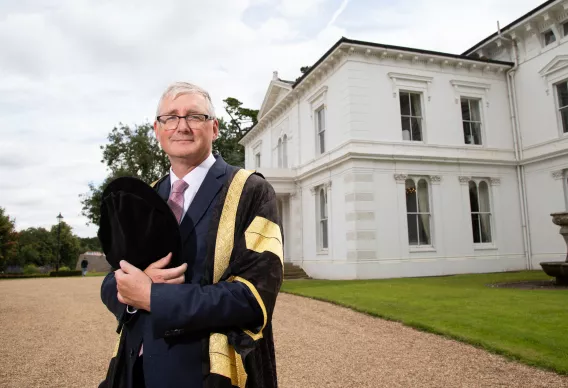

"My co-op was the first time that I had travelled outside the island of Ireland, so you can immediately see the tangible impact"
To celebrate 50 Years of Cooperative Education at University Limerick, Professor Shane Kilcommins shared his experience as a European Studies student travelling abroad for the first time, how co-op has influenced his career to date, and some advice for future co-op students.
In the coming months, we will be sharing stories from 49 other graduates across diverse industries and roles. As they reflect on their time on placement, where they are today, and how their co-op experiences have shaped their careers.
Tell us a bit about yourself, what course did you study in UL, what has your career looked like to date?
I came to UL in 1990, to study European Studies with the Law option. UL was attractive because you could take beginners German as a language option. I did Latin for my Leaving Certificate – a great subject but not high on employability needs, an important factor as I grew up in the 1980s where there was high unemployment and high emigration. Indeed emigration then seemed like an inevitability. After completing a really interesting and comprehensive degree, I wanted to be a solicitor. However, it was incredibly difficult to get an apprenticeship at the time. As an alternative, I was offered a scholarship to undertake a Ph.D. at the University of Wales, Aberystwyth. I accepted this offer. Two weeks later I received an offer of an apprenticeship with a firm in Gorey. I decided in the circumstances to honour the commitment that I had made – thus beginning a journey in scholarship rather than professional practice. It turned out to be a good decision. ‘Aber’ was a fabulous old University by the sea, with a great tradition in the discipline of Law. I really learnt my craft about academic life and scholarship in four wonderful years there as a tutor and lecturer. I also really came to appreciate the strength and comprehensiveness of my undergraduate degree, which sustained me in the early years of my Ph.D. I think that UL students also had a strong work ethic given that we had exams three times per academic year. We were therefore used to an intensity of work that was not perhaps as apparent in older Universities where students only had to ‘peak’ once at the end of the year. I quickly realised that my undergraduate education was not standard or orthodox. It combined innovative curriculum, assessment and work placement that shaped all of us who attended the institution in multiple way. This was of course due to the leadership of Dr Ed Walsh, a unique and special visionary, who took a sledgehammer to reified educational practices and the narrow status quo that existed in higher education in Ireland for over 100 years.
After returning to Ireland, I spent most of my career lecturing in Evidence Law and Jurisprudence in UCC. I really enjoyed Cork, the students, and the staff, and was grateful for the opportunity to develop my career in the Law School. In 2014, I returned to UL as Head of the School of Law and then Dean of the Faculty of Arts, Humanities and Social Sciences. This return to UL reminded me once again of the standard of education across our programmes of study, and the commitment, dedication and professionalism of staff in UL. The University had changed in the time since I had left 20 years previously. By 2014, it had become a large, modern institution, and it was obvious the role that it was beginning to have both in the mid-West region and nationally. I was very fortunate to be part of great teams in the School and Faculty, with terrific energy, dynamism and a real ‘can-do’ attitude. In 2022, I moved in to the role of Provost. This was daunting, but it again gave me the opportunity to work with great staff across the Office, all working for the good of the institution and our students.
Tell us a bit about your co-op placement, what organisation did you work with and what year it took place?
My co-op was spent in Germany, first in Munich (1992) and then in Bottrop (in der Nähe von Essen). Unfortunately my language skills were not sufficiently proficient to permit me to study in a University, but in truth I was better off working (and I was earning money!). I was initially employed in Seehaus, a beer garden in the English Gardens in the city centre, before getting work as a postman in Siemens. My co-op was the first time that I had travelled outside the island of Ireland, so you can immediately see the tangible impact. I also think that my learning experiences extended far beyond what Dr Walsh would have envisaged! I think the current director, Patrice, met with me in Munich, to see if I was alive and behaving myself. The former was confirmed. Munich remains my favourite city, and I still follow one of its teams, Bayern. My second co-op was spent in a company, MC Bauchemie, in Bottrop (Ruhr Gebiet). Again, it was a really terrific work experience and my language skills improved dramatically. Co-op is an integral and special part of UL – it was central to my learning and personal development. I look back on it with many fond memories – great fun, great experience, and great personal development.
What impact did your co-op placement have on your future career?
It opened my mind to the possibilities that the world had to offer. For me, coming from the west of Ireland, this was truly life-enhancing, and to have it as part of my educational journey was very special. I can also see the change in students because of their co-op experience. For example, in the discipline of Law, prior to co-op, students have what might be described as a typical student mindset. When they return from co-op, they are starting to ‘think like lawyers’, beginning to imbue the craft, habits and practices associated with the profession. They are also linking what they are learning (paper rules) with the world of professional practice. From a pedagogical standpoint, this is very significant; it strongly facilitates ownership of learning and transitions students into the world of work. We are very fortunate to have such an integrated and embedded co-op programme in UL. It is truly one of our great success stories, with a reaching extending to more than 130,000 of us at this point. That is phenomenal.
What piece of advice would you give to students going on co-op now?
Embrace it to the full. Accept all aspects and dimensions of the experience. It is a scaffolded, safe window into the real world of work. All of the experiences it offers will develop you both professionally and personally. See it in that light.

Contact Details
Cooperative Education: +353-61-202044 | coop.info@ul.ie
Careers Services: +353-61-202451 | careers@ul.ie
School Placement: +353-61-202478 | schoolplacement@ul.ie
Address
Cooperative Education & Careers Division,
University of Limerick
Limerick
V94 T9PX
Ireland
Office Location: The offices of the Cooperative Education & Careers Division are located in Room E0007 and Room E0019, in the Main Building. Visitors should come to the University main reception.
